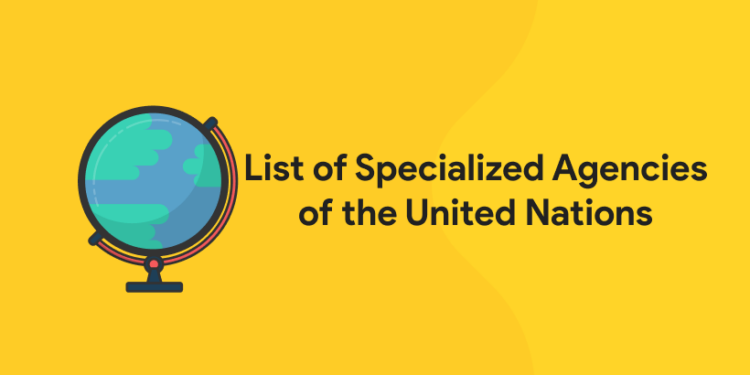Table of Contents
The United Nations is an international organization, working based on its rules and regulations. However, some agencies are under the UN. These agencies are called specialized agencies of the UN. Even though they are under the UN, they have their own procedural rules, governing bodies, funding strategies, and membership.
In a competitive exam, questions relating to international organizations and specialized agencies are most common. For preparation, a list of international organizations and a list of specialized agencies of the United Nations become very handy. Some of the agencies were formed in the 19th century and some were the result of World War I and World War II. Let us have a look into this.
List of specialized agencies of the United Nations
| Sl No: | Name of the Specialized Agencies | HQ |
| 1 | Food & Agricultural Organization (FAO) | Rome |
| 2 | International Civil Aviation Organization (ICAO) | Montreal) |
| 3 | International Fund for Agricultural Development (IFAD) | Rome |
| 4 | International Labor Organization (ILO) | Geneva |
| 5 | International Monetary Fund (IMF) | Washington, DC |
| 6 | International Maritime Organization (IMO) | London |
| 7 | International Telecommunications Union (ITU) | Geneva |
| 8 | United Nations Educational, Scientific & Cultural Organization(UNESCO) | Paris |
| 9 | United Nations Industrial Development Organization (UNIDO) | Vienna |
| 10 | United Nations World Tourism Organization(UNWTO) | Madrid |
| 11 | Universal Postal Union (UPU) | Bern, Switzerland |
| 12 | World Health Organization(WHO) | Geneva |
| 13 | World Intellectual Property Organization (WIPO) | Geneva |
| 14 | World Meteorological Organization (WMO) | Geneva |
| 15 | World Bank | Washington, DC |
Get Higher Rank on Competitive Exams-Download Entri App Now!
What are the duties of specialized agencies of the UN?
- Food and Agricultural Organization (FAO) functions to:
- Improve nutrition and fight hunger
- Promote sustainable agricultural development by encouraging countries.
- International Civil Aviation Organization (ICAO) functions to:
- Facilitate reliable and efficient international air travel
- Regulate the overall aviation
- International Fund for Agricultural Development (IFAD) functions to:
- Empower agricultural practices in rural areas
- Eradicate hunger, poverty, and malnutrition
- International Labor Organization (ILO) functions to:
- Promote equality in workplaces
- Promote safety in workplaces
- Maintains a database of labor and employment strategies of every nation
- International Monetary Fund (IMF) functions to:
- Stabilize the international monetary system
- Solve financial crisis
- International Maritime Organization (IMO) functions to:
- Monitor international shipping
- Regulate a framework for shipping
- Assign universally accepted security and standards for shipping
- International Telecommunications Union (ITU) functions to:
- Maintain connectivity in telecommunication networks
- Allocate satellite orbits and radio spectrum
- Improve the standards to enable connectivity all over the world.
- United Nations Educational, Scientific and Cultural Organization (UNESCO) functions to:
- Encourage international cooperation in the fields of education, science, and culture.
- Protect cultural heritage
- United Nations Industrial Development Organization (UNIDO) functions to:
- Promote industrial development to alleviate poverty, environmental sustainability, and inclusive globalization.
- United Nations World Tourism Organization (UNWTO) functions to:
- Promote inclusive economic growth and development
- Facilitate environmentally sustainable tourism strategies and practices.
- Universal Postal Union (UPU) functions to:
- Improve postal products and services with new technologies.
- World Health Organization (WHO) functions to:
- Improve the health of individuals
- Provide health care services
- Prevent and treat communicable and non-communicable diseases
- Enable countries to manage emergencies
- Prevent pandemics.
- World Intellectual Property Organization (WIPO) functions to:
- Service for protecting IP rights across borders
- Establish common standards to facilitate information
- Maintain searchable databases
- Provide mechanisms for resolving IP disputes.
- World Meteorological Organization (WMO) functions to
- Promote international cooperation among the national meteorological and hydrological entities that monitor the weather and climate conditions
- World Bank functions to:
- Reduce poverty by giving policy advice, financing, and technical assistance to developing countries.
For more general knowledge and current affairs, kindly check into Entri App.
Frequently Asked Questions
What are the specialized agencies of the United Nations?
Specialized agencies are autonomous organizations working with the UN. They address specific global issues like health, agriculture, and education.
How do specialized agencies of the United Nations differ from other UN bodies?
Specialized agencies are independent with their own budgets and governance. They coordinate with the UN but operate autonomously.
Why is it important for these agencies to have headquarters in different cities around the world?
Different headquarters ensure regional expertise and effective program implementation. It also promotes international cooperation and communication.
Can you give an example of a specialized agency and its primary function?
The WHO, based in Geneva, coordinates global health efforts. It responds to health emergencies and sets health standards.
How do countries benefit from the work of these specialized agencies?
Countries receive technical assistance, development funding, and access to international best practices. This helps address global challenges effectively.














